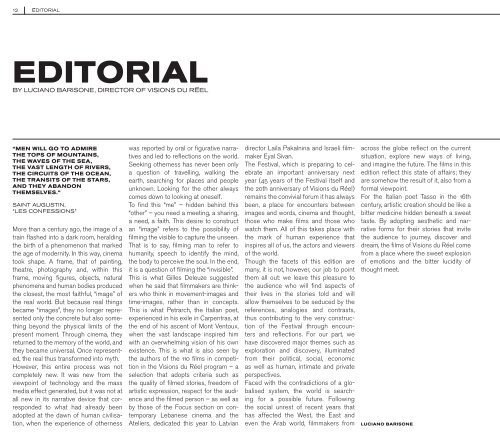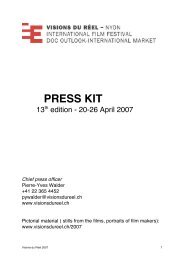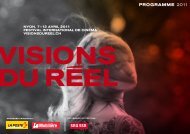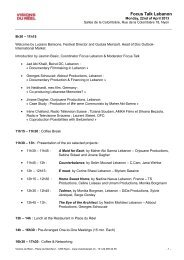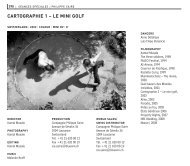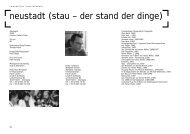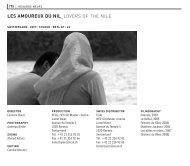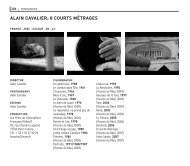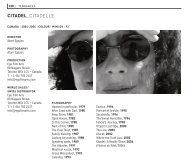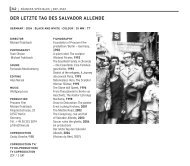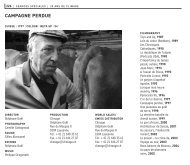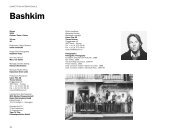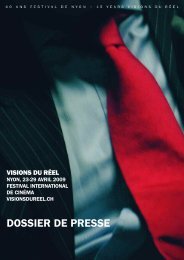Katalog 2013.pdf - Visions du Réel
Katalog 2013.pdf - Visions du Réel
Katalog 2013.pdf - Visions du Réel
You also want an ePaper? Increase the reach of your titles
YUMPU automatically turns print PDFs into web optimized ePapers that Google loves.
12 éditorial<br />
editorial<br />
by LUCIANO barisone, director of visions <strong>du</strong> réel<br />
“Men will go to admire<br />
the tops of mountains,<br />
the waves of the sea,<br />
the vast length of rivers,<br />
the circuits of the ocean,<br />
the transits of the stars,<br />
and they abandon<br />
themselves.”<br />
Saint Augustin,<br />
“Les Confessions”<br />
More than a century ago, the image of a<br />
train flashed into a dark room, heralding<br />
the birth of a phenomenon that marked<br />
the age of modernity. In this way, cinema<br />
took shape. A frame, that of painting,<br />
theatre, photography and, within this<br />
frame, moving figures, objects, natural<br />
phenomena and human bodies pro<strong>du</strong>ced<br />
the closest, the most faithful, “image” of<br />
the real world. But because real things<br />
became “images”, they no longer represented<br />
only the concrete but also something<br />
beyond the physical limits of the<br />
present moment. Through cinema, they<br />
returned to the memory of the world, and<br />
they became universal. Once represented,<br />
the real thus transformed into myth.<br />
However, this entire process was not<br />
completely new. It was new from the<br />
viewpoint of technology and the mass<br />
media effect generated, but it was not at<br />
all new in its narrative device that corresponded<br />
to what had already been<br />
adopted at the dawn of human civilisation,<br />
when the experience of otherness<br />
was reported by oral or figurative narratives<br />
and led to reflections on the world.<br />
Seeking otherness has never been only<br />
a question of travelling, walking the<br />
earth, searching for places and people<br />
unknown. Looking for the other always<br />
comes down to looking at oneself.<br />
To find this “me” – hidden behind this<br />
“other” – you need a meeting, a sharing,<br />
a need, a faith. This desire to construct<br />
an “image” refers to the possibility of<br />
filming the visible to capture the unseen.<br />
That is to say, filming man to refer to<br />
humanity, speech to identify the mind,<br />
the body to perceive the soul. In the end,<br />
it is a question of filming the “invisible”.<br />
This is what Gilles Deleuze suggested<br />
when he said that filmmakers are thinkers<br />
who think in movement-images and<br />
time-images, rather than in concepts.<br />
This is what Petrarch, the Italian poet,<br />
experienced in his exile in Carpentras, at<br />
the end of his ascent of Mont Ventoux,<br />
when the vast landscape inspired him<br />
with an overwhelming vision of his own<br />
existence. This is what is also seen by<br />
the authors of the 110 films in competition<br />
in the <strong>Visions</strong> <strong>du</strong> Réel program – a<br />
selection that adopts criteria such as<br />
the quality of filmed stories, freedom of<br />
artistic expression, respect for the audience<br />
and the filmed person – as well as<br />
by those of the Focus section on contemporary<br />
Lebanese cinema and the<br />
Ateliers, dedicated this year to Latvian<br />
director Laila Pakalnina and Israeli filmmaker<br />
Eyal Sivan.<br />
The Festival, which is preparing to celebrate<br />
an important anniversary next<br />
year (45 years of the Festival itself and<br />
the 20th anniversary of <strong>Visions</strong> <strong>du</strong> Réel)<br />
remains the convivial forum it has always<br />
been, a place for encounters between<br />
images and words, cinema and thought,<br />
those who make films and those who<br />
watch them. All of this takes place with<br />
the mark of human experience that<br />
inspires all of us, the actors and viewers<br />
of the world.<br />
Though the facets of this edition are<br />
many, it is not, however, our job to point<br />
them all out: we leave this pleasure to<br />
the audience who will find aspects of<br />
their lives in the stories told and will<br />
allow themselves to be se<strong>du</strong>ced by the<br />
references, analogies and contrasts,<br />
thus contributing to the very construction<br />
of the Festival through encounters<br />
and reflections. For our part, we<br />
have discovered major themes such as<br />
exploration and discovery, illuminated<br />
from their political, social, economic<br />
as well as human, intimate and private<br />
perspectives.<br />
Faced with the contradictions of a globalised<br />
system, the world is searching<br />
for a possible future. Following<br />
the social unrest of recent years that<br />
has affected the West, the East and<br />
even the Arab world, filmmakers from<br />
across the globe reflect on the current<br />
situation, explore new ways of living,<br />
and imagine the future. The films in this<br />
edition reflect this state of affairs; they<br />
are somehow the result of it, also from a<br />
formal viewpoint.<br />
For the Italian poet Tasso in the 16th<br />
century, artistic creation should be like a<br />
bitter medicine hidden beneath a sweet<br />
taste. By adopting aesthetic and narrative<br />
forms for their stories that invite<br />
the audience to journey, discover and<br />
dream, the films of <strong>Visions</strong> <strong>du</strong> Réel come<br />
from a place where the sweet explosion<br />
of emotions and the bitter lucidity of<br />
thought meet.<br />
Luciano Barisone


